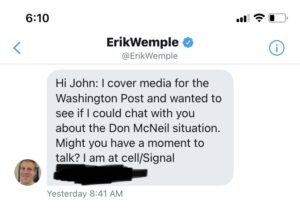Recently, The New York Times has had various problems with their journalists. That includes one, Taylor Lorenz, who falsely claimed someone had used what they considered a slur and then attempted to duck responsibility for that mistake. At least publicly, the Times appears to have not taken action in response to that. Meanwhile, another journalist, Don McNeil, resigned because of controversy surrounding his usage of a racial slur. Yesterday CNN’s Oliver Darcy published a piece about the divisions in the New York Times newsroom over the latter situation and yet another one. One element of the article that stood out for me was this:
But Baquet’s email failed to put the issue to rest. Staffers at The Times signed a letter addressed to Sulzberger which said, “Our community is outraged and in pain. Despite The Times’s seeming commitment to diversity and inclusion, we have given a prominent platform — a critical beat covering a pandemic disproportionately affecting people of color — to someone who chose to use language that is offensive and unacceptable by any newsrooms standards.”
I have a hard time understanding how you could look at the abysmal quality of pandemic coverage in the US, with the US press all but ignoring countries that have well handled it, and be concerned about who gets to provide bad coverage, instead of being concerned about fixing it, seeing as hundred of thousands of Americans have now died unnecessarily (based on the rate of death in New Zealand).
After reading the article, I was still looking to get a better understanding of what was going on. I think a good way to get a better understanding of what is going on with journalism these days is to check out the Twitter pages of journalists. The article mentioned a tweet from a New York Times journalist involved in this situation that I had not heard of, John Eligon, so I went to take a look at his page. His profile says that he is “Covering race for @nytimes“. If we are going to start limiting what beats journalists can cover, it seems problematic to have someone directly involved in an issue covering it. There are journalists who try to stay out areas they cover, for example, some political journalists don’t vote. But looking at his recent tweets indicates that he shouldn’t be dealing with such a complicated subject or working in journalism in general for another reason.
His pinned tweet is this:
NEW: Last summer police in riot gear raided a peaceful violin vigil for a Black man who died at the hands of the police in Aurora, CO. Yesterday, officers held doors and escorted down steps a pro-Trump mob that raided the Capitol. “What a joke.” My latest:
The claim about raiding of “a peaceful violin vigil” is missing important context, here is how Snopes summed that missing context up:
The police involved were attempting to move on a different cohort of protesters who had failed to obey a dispersal order at an adjacent location. According to Aurora police, the officers’ intent was to protect those attending the vigil, rather than to intimidate them, or disrupt the vigil.
(In the wake of that, the police department took a less aggressive stance towards protests, which led to different problems.)
In a tweet, though, you only have so much space for context, so that alone wouldn’t be very concerning. It is another of his tweets, from Tuesday, that is a real problem:
And I never declined to elaborate on those concerns as Erik said. This is a straight lie. If he asked what I was referencing, I would have told him. He only said that he wanted to chat about the McNeil situation, and I said I didn’t want to. Here is the message he sent:
Somehow he is claiming that it is “straight lie” that he “declined to elaborate on those concerns”, but then two sentences later he confirms he didn’t speak with the journalist, Erik Wemple, when asked. He then provides further confirmation that he was asked for comment by including that journalist’s email:

As we have seen repeatedly in recent years journalists have a strong aversion to using the term “lie”, so if you wanted to argue that he should be given the benefit of doubt about making a distinction that doesn’t really exist there, he clearly doesn’t believe in doing that himself.
He appears to have a journalism degree from Northwestern’s Medill School of Journalism, so his comments there can’t be explained ignorance of how journalism works. I don’t see how this then can be explained by something other than him being brazenly dishonest or being mentally unwell, neither of which should be something you should be able to say about a journalist, much less one from the New York Times.
In a follow up tweet he wrote:
@ErikWemple just reached out & we spoke & this seems to have been an honest mistake on his part. I truly appreciate his responsive. I’ve sure made my fair share of mistakes, so would never want to hold a fellow journo to an impossible standard. Thanks for clearing this up Erik!
Looking at the relevant portion of the Erik Wemple story referenced, while changed since what is in included screenshot in the tweets, it states that that he had declined to comment:
John Eligon, who covers race for the Times, tweeted, “Legit concerns were raised by Black employees who worked alongside Don.” Eligon declined to comment when contacted on Twitter, and later tweeted that the concerns were “that a staff member used the N word AND was alleged to have spoken disparagingly about Black teens. It wasn’t referencing any other allegations of misdeeds by Don.”
For good reason, it is true and not a lie, straight or otherwise.
In another tweet related to the firing, he wrote this:
And for good measure, I’ll say it for the millionth time: Neither I, nor any of my colleagues I’ve discussed this with, called for Don’s ouster. The letter 150 of us signed never asked for that either. We wanted more information, more transparency. Take those facts as you will.
The whole letter doesn’t appear to be public, but a part that is public seems to contradict that:
Despite The Times’s seeming commitment to diversity and inclusion, we have given a prominent platform — a critical beat covering a pandemic disproportionately affecting people of color — to someone who chose to use language that is offensive and unacceptable by any newsrooms standards.
That doesn’t appear to be a request for information or transparency. It does appear to be calling for his removal from that beat, just without explicitly saying that. A journalist’s reply to his tweet suggested making the letter public (in the name of transparency), which would clear that up, and for clarification, but no response was provided.
I have contacted New York Times asking why in light of his tweets why they would continue to employ him, though I don’t know why they would respond to my blog.
Another one of his most recent tweets show on his page stated he will speaking at event from the Northwestern’s Medill School of Journalism, which seems like a bad idea if they care about journalism. I have contacted the organizer of the event to ask why they would have someone with a problem with the truth, though I don’t know why they would respond to my blog either.
